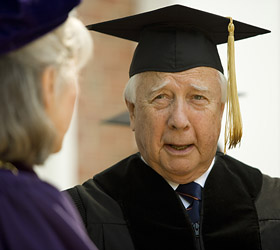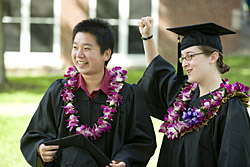Bates graduates 387 in 140th Commencement
Sent on their way with armfuls of good advice — including best-selling historian David McCullough’s suggestion that “however little television you watch, watch less” — 387 Bates College students made the transition from seniors to alumni at the college’s 140th Commencement, on May 28.
“Choose work you love,” McCullough said. “Work hard. Take your work seriously, not yourself. Don’t let setbacks or skeptics get you down. And when, as is bound to happen, some supposedly all-knowing somebody says to you, ‘Well, welcome to the real world,’ remember that Bates College too is the real world. Remember that Shakespeare, and Cervantes, Botticelli and Tchaikovsky are the real world.” (Follow this link to transcripts of the honorand addresses and citations.)
Receiving honorary degrees at the 10 a.m. ceremony were McCullough and the Shakespearean scholar and cultural critic Marjorie Garber, of Harvard University; AIDS-HIV researcher David Ho, who pioneered the “drug cocktail” therapy that has drastically reduced deaths from the disease; and acclaimed choreographer Mark Morris.
A relaxed gathering of some 2,100 heard President Elaine Tuttle Hansen cite “Middlemarch” author George Eliot in her introduction. “Who can quit young lives after being long in company with them,” Hansen quoted Eliot, “and not desire to know what befell them in after years?”
Calling the occasion “a difficult moment of letting go,” Hansen reminded the gathering that it was also a time to reflect on this milestone and “a welcome opportunity to pause, to extend and to hold this moment of being in company with you.”
Perhaps the most widely known of the four honorands was McCullough, a Pulitzer Prize-winning chronicler of U.S. history and host of public television’s “The American Experience.” Even if he hadn’t told the graduates, “Read history, history, history,” McCullough’s calling was apparent in the rest of his address. This succinct list of time-tested bits of advice ranged from drollery — always tip the chambermaid in your hotel — to foundational values. McCullough concluded by telling the seniors, “Count your blessings as Americans and sometime, some way, do something for your country.”
The William R. Kenan Jr. Professor of English and American Literature and Language at Harvard and author of four influential books about Shakespeare, Garber took the opportunity to offer the graduates some advice about advice itself. With Shakespeare the source of so many platitudes, she pointed out, it’s wise to remember that the Bard’s fine words lose their flavor on the tongues of such characters as Polonius and Iago.
Instead, Garber prefered to share the counsel of one John Bates, from “Henry V” — a character she called “the prototype of the honorable, careful man.” Borrowing from Bates, Garber told her listeners to “be friends with the other citizens of this very small world, in which we all live and act and perform.” She said, “We have quarrels out there enough.”
AIDS researcher Ho, who was born in Taiwan and came to this country at age 12, drew applause with his comments about the current national dispute over illegal immigration.
“Throughout its history, American has continually benefited from the drive, labor and creativity of immigrants,” he said. “Thus today, one prevailing view that they constitute a constant drain on our society is baseless and shameful, especially in a nation of immigrants.”
Morris, who since the 1980s has been one of the leading lights in American choreography, spoke last and the most briefly. He started with his own distinctive brand of advice — “Have safe sex. Your mother was right. If you need to believe in God, be sure that you find a god that believes in women,” another applause line.
Morris concluded with a long quotation from an essay by the poet Frank O’Hara offering insights into the personal impetus behind creativity. “At times when I would rather be dead the thought that I could never write another poem has so far stopped me,” Morris read.
According to preliminary information from the college registrar, Bates’ 2006 graduating class included 193 men and 194 women. Fifty graduates are from Maine, 168 from the rest of New England and 137 from the other states. Thirty-two came from other countries.
The five most popular majors were economics (49 graduates), political science (46), English and psychology (both with 40) and biology (29). Bachelor of arts degrees went to 299 graduates, and bachelor of science degrees to 88. (At Bates, science degree candidates must take specific fundamental courses for their particular field.)
Thirty-six students majored in two subjects, and Nathaniel Stambaugh of Rhinebeck, N.Y., not only majored in three subjects — mathematics, physics and chemistry — but earned honors in each. Previous triple majors at Bates include Benjamin Wish, who graduated in 2005 as a major in environmental studies, political science and Russian, and Mark Behn of the class of 1996, who majored in geology, math and physics.




